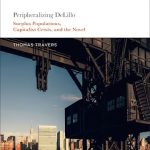fictions present
Gaddis Centenary Roundtable: “Teaching Gaddis Today”
Chaired by Rone Shavers, transcribed by Marie Fahd, and joined by Jeff Jackson and Jacob Singer, this roundtable and discussion took place at the Gaddis Centenary Conference in St Louis, on October 22nd 2022. It has been lightly edited and expanded.
“Honored by the Error”: The Literary Friendship of Gaddis and Gass
Synthesising the published record, Ted Morrissey chronicles and analyzes the relationship between literary Williams Gaddis and Gass, which began in 1976 after Gass had helped secure the National Book Award for Gaddis's J R. Morrissey examines not only the pair's shared social history of meetings, conferences, and letters, but also examines the commonalities in their approaches to literature, and their affinities of taste, habit, and vision.
Gaddis Centenary Roundtable – Artists in Non-literary Media Inspired by Gaddis
This roundtable discussion chaired by Ali Chetwynd, featuring artists Stef Aerts, Thomas Verstraeten, David Bird, Edward Holland, and Tim Youd took place at the Gaddis Centenary Conference in St Louis, on October 21st 2022. It has been lightly edited for clarity. Transcript by Marie Fahd.
“A Long and Uninterrupted Decline”: Accumulation, Empire, and Built Environments in William Gaddis’s The Recognitions
Jack Williams, after noting how the "depiction of U.S. imperialism in The Recognitions has received scant critical attention," gathers a selection of concrete descriptions in Gaddis's first novel of the "built environments" in the New York City and Paris sections, then demonstrates how these settings reflect and expand on the novel’s multi-pronged critique of postwar consumer culture.
An Interview with Rick Moody
Moody's interview is a story about how stories get published, the people who publish, and the perils of single-copy print manuscripts moving through FedEx prior to digital tracking, as well as: "a snapshot of the intricacies of culture as a whole". As an insider perspective on how literary influence operates to perpetuate a continuum, this interview contributes to our awareness of how 'maximalist' bravura epic-comic literature emerges from mimesis and adoration to seed lineage canons (Keaton, Beckett, Pynchon, Gaddis, Moody).
Vaihinger’s Not So Fleeting Presence: Gaddis, Ballard and DeLillo
Traces of Vaihinger appear in Gaddis’s first novel, The Recognitions. But what of the rest of his corpus? John Soutter explores Vaihinger's influence on Gaddis.
"Trouble with the Connections": J R and the "End of History"
Benjamin Bergholz provides a detailed description of the neoliberal hellscape prophesized in J R. Bergholz identifies a dialectical relationship between our necessary failure as readers to fully comprehend the full details of J R's world, and the historical developments—mainly, the "end of history"—that drive this failure. He asks, how might Gaddis’s decision to impair the reader’s "ability to see what is happening" in the world of his novel help us better engage with "what is happening" in the world outside of it?
The Specter of Capitalism
In his review of Thomas Travers' book "Peripheralizing DeLillo", Conte explores the thematic undercurrents of capitalism and its discontents across Don DeLillo's oeuvre.
New Directions for Gaddis Scholarship
A talk given on October 20th 2022 at the William Gaddis Centenary Conference at Washington University St Louis. The version presented here is the talk as delivered, with minor edits only for clarity on the page and standardized grammar. Steven Moore prefers to leave the talk as a document of its original presentation, rather than changed into an academic article with the attendant scholarly apparatus of footnotes, works cited, and so on.
Futures of Gaddis Studies: Visions for the Next 100 Years
We asked our contributors a set of simple questions: what do you think Gaddis Studies has best covered already, what do you think are its prospects for the future, and what future avenues would you like to see explored?

